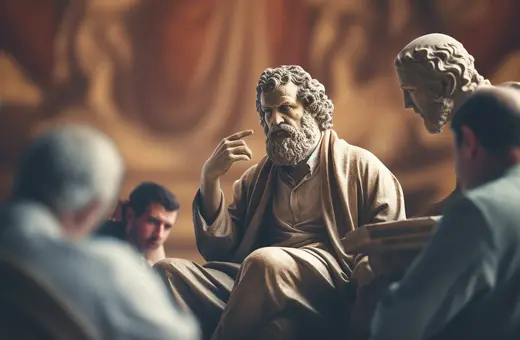Africa’s diverse philosophical traditions unfold striking accounts of ‘the good life’.
“Be not haughty with what you have learned and now know, hold forth with the unknowing as well as the sagacious,” reads the first thesis of Ptahhotep – an ancient Egyptian official who lived c. 2400 BCE, who distilled a vision of how one ought to live in thirty-seven theses. “None knows all. Excellent discourse is better than the most precious stones and is found in the most unlikely of places,” he went on.
In West Africa, Orunmila – a sage born c. 500 BCE and considered to be the most important figure in the Ifa philosophical tradition – taught that Iwa (living a virtuous life) is the most important ideal worth living for. “What matters most is good character,” rings one characteristic teaching of Orunmila. “You may be wealthy, have many children and build several houses; all come to naught if you lack good character. A life without moral rectitude is nothing but vanity.”
In the same vein, the vast corpus of ancient Ethiopian wisdom literature has concerned itself with the ‘art of living.’ Zara Yacob’s Hatata, arguably the most celebrated treatise in the Ethiopian philosophical tradition, deftly meshes the autobiographical with stringently rigorous arguments about the nature of rationality, faith, and ethics. “Why is it that all men do not adhere to truth, instead believing in falsehood?” Yacob asks. He then goes on to enumerate the reasons, pointing out that people believe their holy scriptures without questioning them, critiquing their tendency to follow ‘tradition’ slavishly, and arguing that religious beliefs are a means through which rulers manipulate and control their subject populations.
___
"A life without moral rectitude is nothing but vanity."
___
Modern African philosophy continues to be animated by philosophy as a guide to the good life. In the mid-1970s, the Kenyan philosopher Odera Oruka undertook a ‘Sage Philosophy Project’ for which he interviewed sages – people designated as wise in various African communities – on metaphysics, epistemology, ethics and philosophy of religion. Oruka highlights strikingly critical, self-reflective practices of thought flourishing in societies often caricatured in the North Atlantic world as lacking abstract, second-order thinking.
But in one of his interviews, for instance, Njeru wa Kanyenje, a sage from the Aembu community in central Kenya, pushed back against religious beliefs and ways of life: “I do not care much about God or religion. Right from the beginning, that is, when the muzungu [white people] first brought organized religion, I saw religion as a bluff. It is a white man’s witchcraft! But this witchcraft has today triumphed over the traditional African witchcraft. Today, I recognise its victory but not its truth. It is still a bluff. I do not pray to God nor do I consult witchdoctors. Both religion and witchcraft are bluffs. They have no truths in them. My great wish is that I should be spared the interference from religions and witchcrafts.”
Chaungo Barasa, a sage from Western Kenya, articulates a perfectionist concept of the good which he calls ‘humanization’: “The means to humanization is knowledge. By humanization, I mean the perfection of human life. To humanize is to live out the gift of human virtues to the utmost full. Man is always struggling to realize the human element to the full. That realisation comes through knowledge. And that is why knowledge or wisdom should be regarded highly, for through the path of knowledge, man tends towards the ideal of humanization which is the highest good for man.”



















Join the conversation